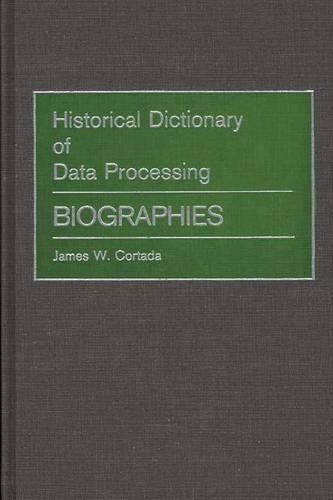
Historical Dictionary of Data Processing: Biographies
(Hardback)
Available Formats
Hardback
Published: 12th August 1987
Hardback
Published: 4th June 1987
Hardback
Published: 23rd June 1987
Publishing Details
Historical Dictionary of Data Processing: Biographies
By (Author) James W. Cortada
Bloomsbury Publishing PLC
Greenwood Press
12th August 1987
United States
Classifications
Tertiary Education
Non Fiction
004.0321
Physical Properties
Hardback
334
Description
This dictionary offers a ready reference to the biographies of more than 160 individuals prominent in the history of data processing. It includes scientists, engineers, government officials, executives of major computer manufacturing companies, and users of data processing technology, and extends in time from antiquity through the 1980s. In an attempt to inform readers at all levels of specialization, the volume gives basic information to the general reader while providing reference materials that will serve the specialist as a starting point for further research.
Reviews
[A] tour-de-force appearing as a three-volume work....[T]hese volumes are especially useful for tracing computer development....This is an excellent "first reference" source.-Communication Booknotes Quarterly
Although Cortada's three volumes are interrelated and are meant to be used together, LC has regrettably classed them separately. Taken together, the volumes offer access to more than 400 entries on all aspects of data processing. They chronicle the history of those individuals and organizations that have contributed to the evolution of data processing over the past two decades, and jointly form a reference work that has no present parallel in the applied sciences. The introduction is a thorough history of the computer age. Biographies contains entries for people who made significant contributions to the industry from its infancy to the present. This is the first biographical collection to include both scientists and industrialists important to the development of computing. Although most of those included have been active in the 20th century, there are entries for important earlier contributors (e.g., John Napier, 1550-1617 and Blaise Pascal, 1623-1666). Among those listed are scientists, industrialists, developers, government officials, and business people, all inventors in their own way. A baby boomer can claim to have seen the computer industry virtually in its entirety--the development and evolution of components and products, the shifts in labor markets, developments in trade, marketing, and specifications. Cortada has pulled together a large amount of information to provide a concise history of data processing. References are contained in endnotes to articles rather than in general bibliographies; indexing is well done, and cross-references are relevant and useful. An important set, enlightening and a pleasure to read, that belongs in all libraries that collect on any aspect ofdata processing.-Choice
"A tour-de-force appearing as a three-volume work....These volumes are especially useful for tracing computer development....This is an excellent "first reference" source."-Communication Booknotes Quarterly
"[A] tour-de-force appearing as a three-volume work....[T]hese volumes are especially useful for tracing computer development....This is an excellent "first reference" source."-Communication Booknotes Quarterly
"Although Cortada's three volumes are interrelated and are meant to be used together, LC has regrettably classed them separately. Taken together, the volumes offer access to more than 400 entries on all aspects of data processing. They chronicle the history of those individuals and organizations that have contributed to the evolution of data processing over the past two decades, and jointly form a reference work that has no present parallel in the applied sciences. The introduction is a thorough history of the computer age. Biographies contains entries for people who made significant contributions to the industry from its infancy to the present. This is the first biographical collection to include both scientists and industrialists important to the development of computing. Although most of those included have been active in the 20th century, there are entries for important earlier contributors (e.g., John Napier, 1550-1617 and Blaise Pascal, 1623-1666). Among those listed are scientists, industrialists, developers, government officials, and business people, all inventors in their own way. A baby boomer can claim to have seen the computer industry virtually in its entirety--the development and evolution of components and products, the shifts in labor markets, developments in trade, marketing, and specifications. Cortada has pulled together a large amount of information to provide a concise history of data processing. References are contained in endnotes to articles rather than in general bibliographies; indexing is well done, and cross-references are relevant and useful. An important set, enlightening and a pleasure to read, that belongs in all libraries that collect on any aspect ofdata processing."-Choice
Author Bio
JAMES W. CORTADA is Senior Marketin Programs Administrator for the IBM Corporation.
